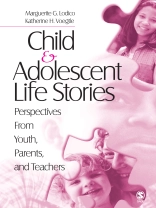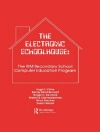The uniqueness of Child and Adolescent Life Stories lies in the multiple perspectives drawn from youth, their parents, and their teachers. These perspectives provide a range of lenses through which a student or beginning teacher may view child and adolescent development. The complex processes of development occur within a social context, and therefore a professional teacher, administrator, or school psychologist will need to be able to view developmental stages from youths′ perspectives as well as from their various social settings.
The twelve cases in this book were compiled from interviews and observations done with youth, their parents, and their teachers. The cases were then written from multiple perspectives, allowing the reader an opportunity to understand the influence of family, school, and society on the youths′ development. Each case tells a youth′s life story, including the events and relationships that have influenced the child and his or her cognitive, social, and emotional development. The youth in these cases represent a cross section of ages and socio-economic levels and exhibit diversity in their ethnic backgrounds, religious/spiritual beliefs, gender, family structures, and disabilities.
The cases are intended to elicit discussion on a wide range of issues in development. To this end, this book explores many critical (and sometimes controversial) topics, such as teen pregnancy, sexual orientation, disabilities, child abuse, domestic violence, death of a parent, and more. This will allow instructors the greatest possible flexibility in supplementing their courses with life histories and cases. These cases are the perfect illustration of the complexity of a full life history.
Key Features
• Each case includes discussion questions and research and classroom activities, allowing students to further examine the issues presented in the case
• Matrix organizes cases by subject′s socio-economic level, ethnic background, gender, etc., allowing instructors and readers to pinpoint the most relevant cases for their study
• ’Connecting Across Cases’ feature poses questions that encourage students to consider developmental issues in two or more cases
• Cases cover the full range of development, from ages 4 to 18, which mirrors the range covered in most child and adolescent development courses and texts
‘This collection of stories provides some of the rich descriptive detail needed to put the complex process of development into perspective.’
—Miles Irving, Georgia State University
‘This is an excellent endeavor—well conceptualized and well executed. I would most definitely like to use this text in my undergraduate development classes.’
—Judith Rhoden, University of North Carolina, Charlotte
‘These case studies allow the reader a glimpse at the individual, family, and community dynamics that go into making each child who he or she is. This text will make a wonderful supplement for courses dealing with child development, educational psychology, families, communities, and parenting.’
—Deanna Nekovei, Texas A&M University
This book is a welcome addition to the literature. As a reader one gets the sense that these cases are real. The authors do a great job of providing enough detailed information without overloading the reader. Such details allow the reader an opportunity to apply theory to real life examples. And, as a course instructor, these cases will provide me an opportunity to assess whether my students have a firm grasp of the concepts.
—Karen M. Dutt-Doner, Niagara University
Tabella dei contenuti
Acknowledgments
Introduction
Using Cases to Understand Human Development
Chart of Cases
Connecting Across Cases
1. Ben: Having His Way at Preschool and Home
Primary and Secondary Issues
Case
Discussion Questions
Applying Theoretical Perspectives
Class Activities
Research Suggestion
Readings and Resources
2. Keisha: Connecting Across Differences
Primary and Secondary Issues
Case
Discussion Questions
Applying Theoretical Perspectives
Class Activities
Research Suggestions
Readings and Resources
3. Laura: Exploring Social and Creative Potentials in a Six-Year-Old′s Life
Primary and Secondary Issues
Case
Discussion Questions
Applying Theoretical Perspectives
Class Activity
Research Suggestion
Readings and Resources
4. Emily′ World: Nurturing a Child with Autism
Primary and Secondary Issues
Case
Discussion Questions
Applying Theoretical Perspectives
Class Activity
Research Suggestions
Readings and Resources
5. Nicole and Brooke: Homeschooled Fraternal Twins
Primary and Secondary Issues
Case
Discussion Questions
Applying Theoretical Perspectives
Class Activities
Research Suggestions
Readings and Resources
6. Beth: Finding Her Strengths
Primary and Secondary Issues
Case
Discussion Questions
Applying Theoretical Perspectives
Class Activity
Research Suggestions
Readings and Resources
7. Edward: Full of Life and Always Moving
Primary and Secondary Issues
Case
Discussion Questions
Applying Theoretical Perspectives
Class Activities
Research Suggestion
Readings and Resources
8. Frank: Confronting Change and Taking a Stand in Middle School
Primary and Secondary Issues
Case
Discussion Questions
Applying Theoretical Perspectives
Class Activities
Research Suggestion
Readings and Resources
9. Talisha: Overcoming Loss With a New Family
Primary and Secondary Issues
Case
Discussion Questions
Applying Theoretical Perspectives
Class Activities
Research Suggestions
Readings and Resources
10. Elena: Surviving Family Problems
Primary and Secondary Issues
Case
Discussion Questions
Applying Theoretical Perspectives
Class Activities
Research Suggestions
Readings and Resources
11. Hector: Talking Through Troubles
Primary and Secondary Issues
Case
Discussion Questions
Applying Theoretical Perspectives
Class Activities
Research Suggestions
Readings and Resources
12. Jaime: Crossing Cultures and Celebrating Life
Primary and Secondary Issues
Case
Discussion Questions
Applying Theoretical Perspectives
Class Activities
Research Suggestion
Readings and Resources
References
Index
About the Authors
Circa l’autore
Marguerite G. Lodico (Ed.D. and M.Ed. University of Houston [Educational Psychology] and B.A. State University of New York at Stony Brook [History/Secondary Education]) is Professor of Educational Psychology at College of Saint Rose. She has served as Acting Dean of the School of Education and Department Chair of the department of Educational Psychology. She regularly teaches courses in child psychology, developmental psychology, and educational research. She was honored as the university’s “Faculty of the Year” in 1997 and 2003.












